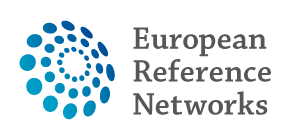
European Reference Networks (ERNs) assemble THE European clinical expertise centres for rare diseases. Four ERNs (ERN-RND, Euro-NMD, -ITHACA and -GENTURIS) form the clinical core of Solve-RD due to their unsolved RD cohorts, diagnostic research expertise and infrastructure. Each ERN established their own Data Interpretation Task Force.
In addition, two ERNs (ERN-EpiCare and -RITA) have recently joined the project as associated ERNs. They also contribute their unsolved RD cohorts and diagnostic research expertise via a Data Interpretation Task Force.
The Group
ERN-RND
ERN-RND focuses on rare movement and cognitive disorders such as ataxias, hereditary spastic paraplegias (HSPs), frontotemporal dementias (FTDs), and paroxysmal disorders. The following organisations are involved in and contributing to Solve-RD:
- Beneficiaries: University Hospital Tübingen, Radboud UMC Nijmegen, INSERM Brain & Spine Institute, UCL Institute of Neurology
- Associated partners: University of Ljubljana, Ljubljana, Slovenia (Borut Peterlin); University Hospital Schleswig-Holstein, Lübeck, Germany (Katja Lohmann); Vall d'Hebron Barcelona Campus Hospital, Barcelona Spain (Alfons Macaya); Semmelweis University, Budapest, Hungary (Peter Balisza, Judit Molnar); University of Cambridge, Cambridge, UK (Rita Horvath); Ghent University Hospital, Ghent, Belgium (Bruce Poppe, Dimitri Hemelsoet); Koç University, Istanbul, Turkey (Ayşe Nazlı Başak); University of Crete, Rethymno, Greece (Ioannis Zaganas)
ERN-EURO NMD
ERN-EURO NMD focuses on neuromuscular disorders (NMDs) such as congenital and limb girdle muscular dystrophies, hereditary neuropathies, congenital myasthenic syndromes, muscle chanellopathies, and mitochondrial NMDs. The following organisations are involved in and contributing to Solve-RD:
- Beneficiaries: University of Newcastle upon Tyne, INSERM Institute of Myology, UCL Institute of Child Health, UCL Institute of Neurology, University of Antwerp, University of Naples, University of Ferrara
- Associated partners: The Folkhälsan Research Center, Helsinki, Finland (Bjarne Udd, Peter Hackman); University of Freiburg, Freiburg, Germany (Hanns Lochmüller); Oxford University, Oxford, UK (David Beeson); Hospital Sant Joan de Déu Barcelona, Barcelona, Spain (Andres Nascimiento Osorio); University of Cambridge, Cambridge, UK (Rita Horvath); KU Leuven, Belgium (Kristl Claeys); TU Munich, Germany (Isabell Cordts)
ERN-ITHACA
ERN-ITHACA focuses on rare congenital malformation syndromes and intellectual disability. The following organisations are involved in and contributing to Solve-RD:
- Beneficiaries: Radboud UMC Nijmegen, University of Tübingen, Central Manchester University Hospitals, CHU Dijon, Charles University Prague, APHP Paris
- Associated partners: Ospedale Pediatrico Bambino Gesù, Rome, Italy (Marco Tartaglia, Bruno Dellapiccola); University of Siena, Siena, Italy (Alessandra Renieri); Karolinska Institutet, Stockholm, Sweden (Ann Nordgren, Anna Lindstrand); CHU Bordeaux, Bordeaux, France (Didier Lacombe, Aurélien Trimouille, Caroline Rooryck-Thambo); Leiden UMC, the Netherlands (Gijs Santen); Université Catholique de Louvain, Leuven, Belgium (Isabelle Maystadt)
ERN-GENTURIS
ERN-GENTURIS focuses on patients with one of the rare genetic tumour risk syndromes such as colorectal cancer, paragangliomas, and gastric cancer. The following organisations are involved in and contributing to Solve-RD:
- Beneficiaries: Radboud UMC Nijmegen, University Hospital Bonn, IPATIMUP
- Associated partners: Klinikum der Universität München, München, Germany (Elke Holinski-Feder); Catalan Institute of Oncology, Barcelona, Spain (Gabriel Capella); TU Dresden, Dresden, Germany (Evelin Schröck); University of Cambridge, Cambridge, UK (Marc Tischkowitz), MH Hannover, Germany (Bernd Auber)
ERN-EpiCare (associated ERN)
ERN-EpiCare focuses on Rare and Complex Epilepsies. The following organisations are involved in and contributing to Solve-RD:
- Beneficiaries: University of Tübingen, University of Newcastle upon Tyne, University College London, University of Antwerp
- Associated partners: University Hospital Meyer, Florence, Italy (Renzo Guerrini); University of Medicine and Health Science, Dublin, Ireland (Gianpiero Cavalleri); IRCCS G. Gaslini, Genova, Italy (Pasquale Striano); Cliniques universitaires Saint-Luc, Bruxelles, Belgium (Chantal Depondt / Maria-Roberta Cilio)
ERN-RITA (associated ERN)
ERN-RITA focuses on rare immunodeficiency, autoinflammatory and autoimmune diseases. The following organisations are involved in and contributing to Solve-RD:
- Beneficiaries: Radboud UMC Nijmegen, University of Newcastle upon Tyne, Charles University Prague, University Medical Centre Groningen
- Associated partners: Vall d'Hebron Barcelona Campus Hospital, Spain (Roger Colobran); University of Freiburg, Germany (Bodo Grimbacher); Ludwig Boltzmann Institute for Rare and Undiagnosed Diseases, Vienna, Austria (Kaan Boztug / Matthias Haimel)
